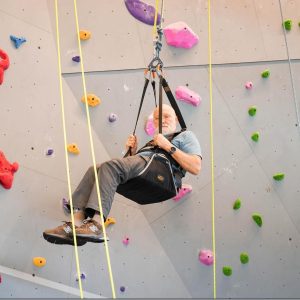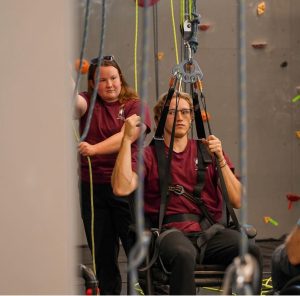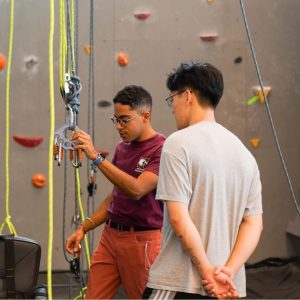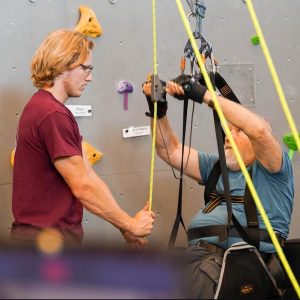24 Community Building and Engagement at McMaster
Adaptive Climbing Showcase at Feather Family Climbing Gym
At the Feather Family Climbing Gym inside The Pulse, we hosted our first Adaptive Climbing Showcase open to all community members. Attendees experienced what ALTITUDE has to offer for inclusive climbing techniques tailored to diverse mobility needs. Filled with an enthusiastic atmosphere and eager risk-takers, our staff showed technical adaptations implemented in rock- and alpine climbing – we also had community members climb using said adaptations. This event aimed to have community members and students with a wide range of disabilities and mobility adaptations climb with relative ease.
Contributors: Yahia Hassan, Serena Tenaschuk, Owen Miller, Hayden Jones, Kelly Lang and Wayne Terryberry, McMaster ALTITUDE
Engineering Community Outreach Offers Barrier-Free Workshop Series
Engineering Community Outreach remains committed to breaking down barriers and providing transformative STEM learning experiences for underrepresented youth. We are thrilled to introduce our barrier-free workshop series, specifically designed for youth living with physical and cognitive disabilities. This initiative is geared towards fostering inclusivity and empowering these individuals to actively participate in STEM activities. This involves working closely with various community partners dedicated to supporting youth with disabilities, thereby creating a curriculum that is both innovative and responsive to the unique needs of this demographic. As part of our commitment to inclusivity, our team is coordinating special training sessions for instructors to equip them with the skills needed to effectively support neurodivergent youth. Additionally, we aim to engage high school participants in meaningful projects during our camps, encouraging them to develop accessible learning tools and devices, contributing to a more inclusive and supportive learning environment.
Contributors: Sarah Alizerig, McMaster Engineering Student Recruitment and Community Outreach
Events for December 3rd: International Day for Persons with Disabilities 2022
In collaboration with university partners, AccessMac Program delivered nine events over the course of 2 weeks to commemorate and celebrate December 3rd: International Day or Persons with Disabilities 2022, including hosting two workshops on digital accessibility and social media accessibility; an Employee Accessibility Network meeting celebrating and debriefing events, and a panel discussion on assistive technologies (AT) & their impacts on those who use them, businesses, the university, & broader society.
The second week of events included five workshops on digital accessibility using accessibility principles from McMaster’s FLEX Forward Accessible Education resource with the MacPherson Institute to create accessible teaching and learning content, activities and Avenue course shells. These events were well attended with 75 persons attending the workshops, and 22 persons attending the EAN meeting. These events created an opportunity for the McMaster community to reflect on the experiences of persons with disabilities, and consider ways forward to create a more inclusive and accessible McMaster.
Contributors: AccessMac Program, Equity and Inclusion Office
MacChangers Helps Build an Inclusive Learning Environment at McMaster University
MacChangers is a co-curricular program where multidisciplinary student groups come up with solution ideas to real problems in the Hamilton or McMaster community open from September 2022 to April 2023. These problems are identified with support from real community members as well. this past year, our program presented the question: How might we assist McMaster University in becoming more inclusive through its built environment to enhance the learning experience and navigation for students with mental, physical, and invisible disabilities? With support from community members such as McMaster Facility Services students learned about accessibility and people with various types of disabilities are impacted on the McMaster campus. Through this, students were able to engage with this topic and come up with solution ideas before presenting these ideas to community members at our final project showcase.
Contributors: Cameron Churchill, Kyle Ansilio, Selena Esteves and Patricia Ferreira, MacChangers Program
Registrar’s Office Accessibility Updates
Our collective efforts have made a significant impact on fostering a more accessible, inclusive, and supportive environment for all students at McMaster University. Below are some key highlights of our achievements in 2022-2023.
Our team successfully completed the Professor Hippo-on-Campus Mental Health Education Program. With this training, we have enhanced our ability to provide a more empathetic and responsive support system for students.
Recognizing the importance of accessibility and flexibility in our services, we extended our online chat support timings until 6:30pm. This extension allowed students with diverse schedules and commitments to access assistance and guidance beyond regular office hours.
We volunteered for various McMaster and community events advocating and informing applicants and students about the financial aid available and how to fund their education. This included Pathways to Education and Compass Community Health, aiding McMaster applicants living in low-income Hamilton communities to apply for OSAP.
Contributors: Leanne Ruiz and Natasha Mehta, Student Services – Registrar’s Office
Student Open Circles
Student Open Circles recruits and coordinates more than 300 McMaster students to volunteer as small groups each week at social service agencies in Hamilton. Each group engages in weekly reflection on social issues related to their placement. At our placement with Conway Opportunity Homes, volunteers assisted and interacted with residents living with physical disabilities through weekly visits. Other placements provide tutoring and activities for underserved children and youth in Hamilton, some of whom are recommended for the program based on learning disabilities or other barriers.
Contributors: Jeff Druery, Student Open Circles
Welcome Week: Community Connections
“Community Connections: Vibing and Thriving” is a Welcome Week event designed to introduce first-year students to their community of support. This includes providing opportunities for students to make friends, experience a sense of belonging and discover valuable services, programs and resources to support their success.
In 2024, the campus departments showcased during the event were chosen to reflect intersectional student experiences, with accessibility and inclusion as key priorities. Participating departments included:
- Alumni Association
- Athletics & Recreation
- Emergency First Response Team
- Indigenous Student Services
- International and Exchange Student Experience
- Latin American Network at McMaster University
- MacChangers
- McMaster Office for the Development of English Language Learners
- Open Circle
- Pride Community Centre
- Sexual Violence Prevention Response Office (SVPRO) and Equity and Inclusion Office (EIO)
- Student Success Centre: First-Year Experience, Spiritual Care and Learning Centre (SCLC)
- Student Wellness Centre
- The Diversity + Equity Network
- The Forge
The event also prioritized accessibility and disability inclusion through best practices related to event layout, seating, mobility and providing multiple ways to participate.
Contributors: Student Success Centre: Sean Beaudette, Katie Fitzgerald, Adam Moniz and Catherine Martin; Student Affairs: Jacqueline Hampshire




